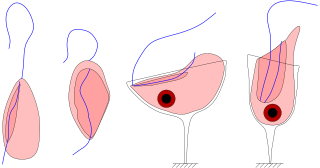
Proserpina or Proserpine is an ancient Roman goddess whose cult, myths and mysteries were combined from those of Libera, an early Roman goddess of wine. In Greek she is known as Persephone and her mother is Demeter, goddesses of grain and agriculture. The originally Roman goddess Libera was daughter of the agricultural goddess Ceres and wife to Liber, god of wine and freedom. In 204 BC, a new "Greek-style" cult to Ceres and Proserpina as "Mother and Maiden" was imported from southern Italy, along with Greek priestesses to serve it, and was installed in Libera and Ceres' temple on Rome's Aventine Hill. The new cult and its priesthood were actively promoted by Rome's religious authorities as morally desirable for respectable Roman women, and may have partly subsumed the temple's older, native cult to Ceres, Liber and Libera; but the new rites seem to have functioned alongside the old, rather than replaced them.

The Messa da Requiem is a musical setting of the Catholic funeral mass (Requiem) for four soloists, double choir and orchestra by Giuseppe Verdi. It was composed in memory of Alessandro Manzoni, an Italian poet and novelist whom Verdi admired. The first performance, at the San Marco church in Milan on 22 May 1874, marked the first anniversary of Manzoni's death. The work was at one time referred to as the Manzoni Requiem. Considered too operatic to be performed in a liturgical setting, it is usually given in concert form of around 90 minutes in length. Musicologist David Rosen calls it 'probably the most frequently performed major choral work composed since the compilation of Mozart's Requiem'.

The following is a list of public holidays in Romania. According to Romanian law, Romania had 51 public holidays as of 2011, which cover 14% of the days of the year in the country.
România liberă is a Romanian daily newspaper founded in 1943 and currently based in Bucharest. A newspaper of the same name also existed between 1877 and 1888.

Libera is an all-boy English vocal group directed by Robert Prizeman. Libera regularly performs concerts in many countries, including the UK, the US and Asia, and regularly makes recordings for their own album releases and other projects.
"Libera me" is a responsory sung in the Office of the Dead in the Catholic Church, and at the absolution of the dead, a service of prayers for the dead said beside the coffin immediately after the Requiem Mass and before burial. The text asks God to have mercy upon the deceased person at the Last Judgment. In addition to the Gregorian chant in the Roman Gradual, many composers have written settings for the text, including Tomás Luis de Victoria, Anton Bruckner, Giuseppe Verdi, Gabriel Fauré, Maurice Duruflé, Igor Stravinsky, Benjamin Britten, Krzysztof Penderecki, Antonio Salieri, Lorenzo Perosi, Arnold Rosner and Patrick Gowers. The Christian technical thrash band Believer also used the entire text in the operatically sung section of "Dies Irae " in their 1990 album Sanity Obscure.

"Libera" was the Italian entry in the Eurovision Song Contest 1977, performed in Italian by Mia Martini, at the time arguably Italy's most successful and celebrated female artist, having had a number of hits like "Padre davvero...", "Gesù è mio fratello", "Credo", "Piccolo uomo", "Donna sola", "Minuetto", "Il guerriero", "Inno", "Al mondo", "Donna con te", "L'amore è il mio orizzonte", "Che vuoi che sia...se t'ho aspettato tanto" on the Italian Hit Parades between the years 1971 and 1976, as well as taking part in the Sanremo Music Festival and the Festivalbar on several occasions.

†Libera tumuloides was a species of small air-breathing land snail, a terrestrial pulmonate gastropod mollusc in the family Endodontidae.

Libera, My Love is a 1975 Italian drama film directed by Mauro Bolognini and starring Claudia Cardinale.

Jakobids are an order of free-living, heterotrophic, flagellar eukaryotes in the supergroup Excavata. They are small, and can be found in aerobic and anaerobic environments. The order Jakobida, believed to be monophyletic, consists of only twenty species at present, and was classified as a group in 1993. There is ongoing research into the mitochondrial genomes of jakobids, which are unusually large and bacteria-like, evidence that jakobids may be important to the evolutionary history of eukaryotes.

Jakoba is a genus in the taxon Excavata and currently has a single described species, Jakoba libera described by Patterson in 1990, and named in honor of Dutch protistologist Jakoba Ruinen.

Libera is a genus of air-breathing land snails, terrestrial pulmonate gastropod mollusks in the family Endodontidae.
Italy was represented by Mia Martini, with the song '"Libera", at the 1977 Eurovision Song Contest, which took place on 7 May in London. Broadcaster RAI chose the song and performer internally. Martini would return to Eurovision in 1992.

Dorocordulia libera, the racket-tailed emerald, is a species of the dragonfly in the family Corduliidae found in North America.

Libera Me is a 2000 South Korean action blockbuster film about a mentally-unbalanced arsonist and the firefighters who struggle to stop him.

Libera me, WAB 21, is the first of two settings of the absoute Libera me, composed by Anton Bruckner in c. 1843.

Libera me, WAB 22, is the second of two settings of the absoute Libera me, composed by Anton Bruckner in 1854.

Libera Folio is an online Esperanto periodical about the Esperanto movement independent from the Universal Esperanto Association, launched on 12 April 2003. It aims to shed light on current developments in the movement soberly and critically. István Ertl and Kalle Kniivilä founded it, with Kniivilä as editor. Jan-Ulrich Hasecke was technical director from 2004 to 2016. In September 2018 Jukka Pietiläinen replaced Kniivilä as editor.














